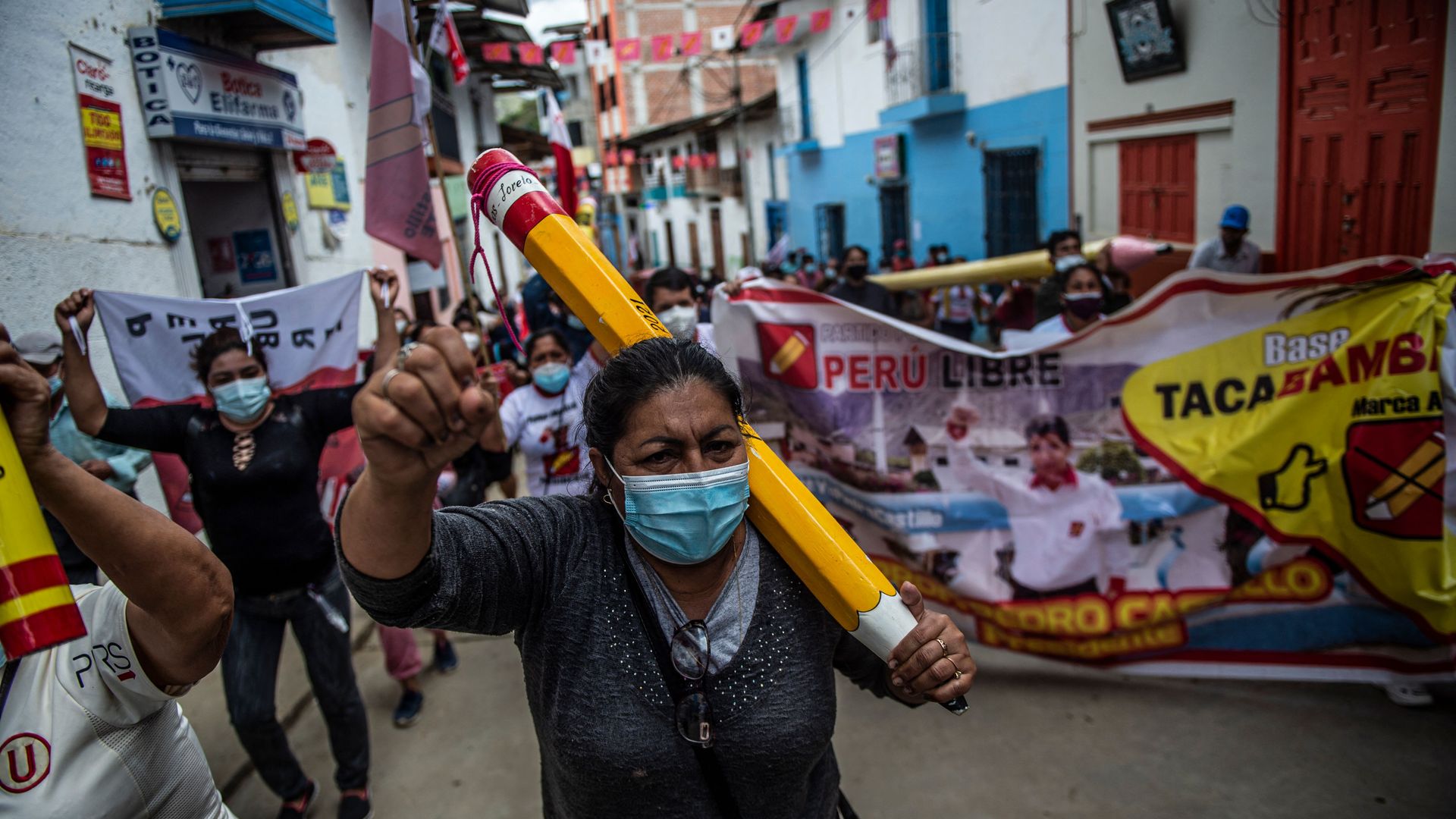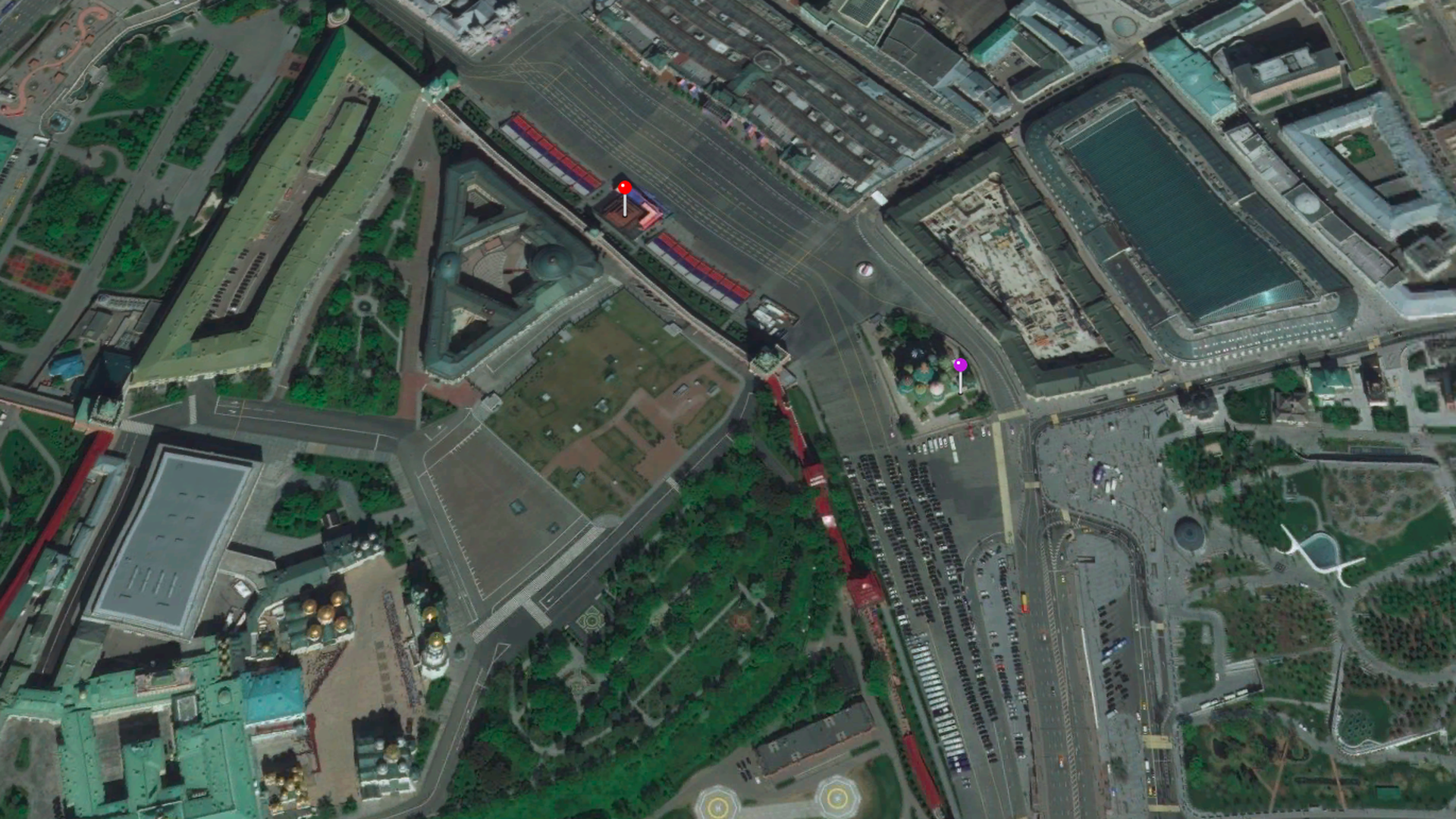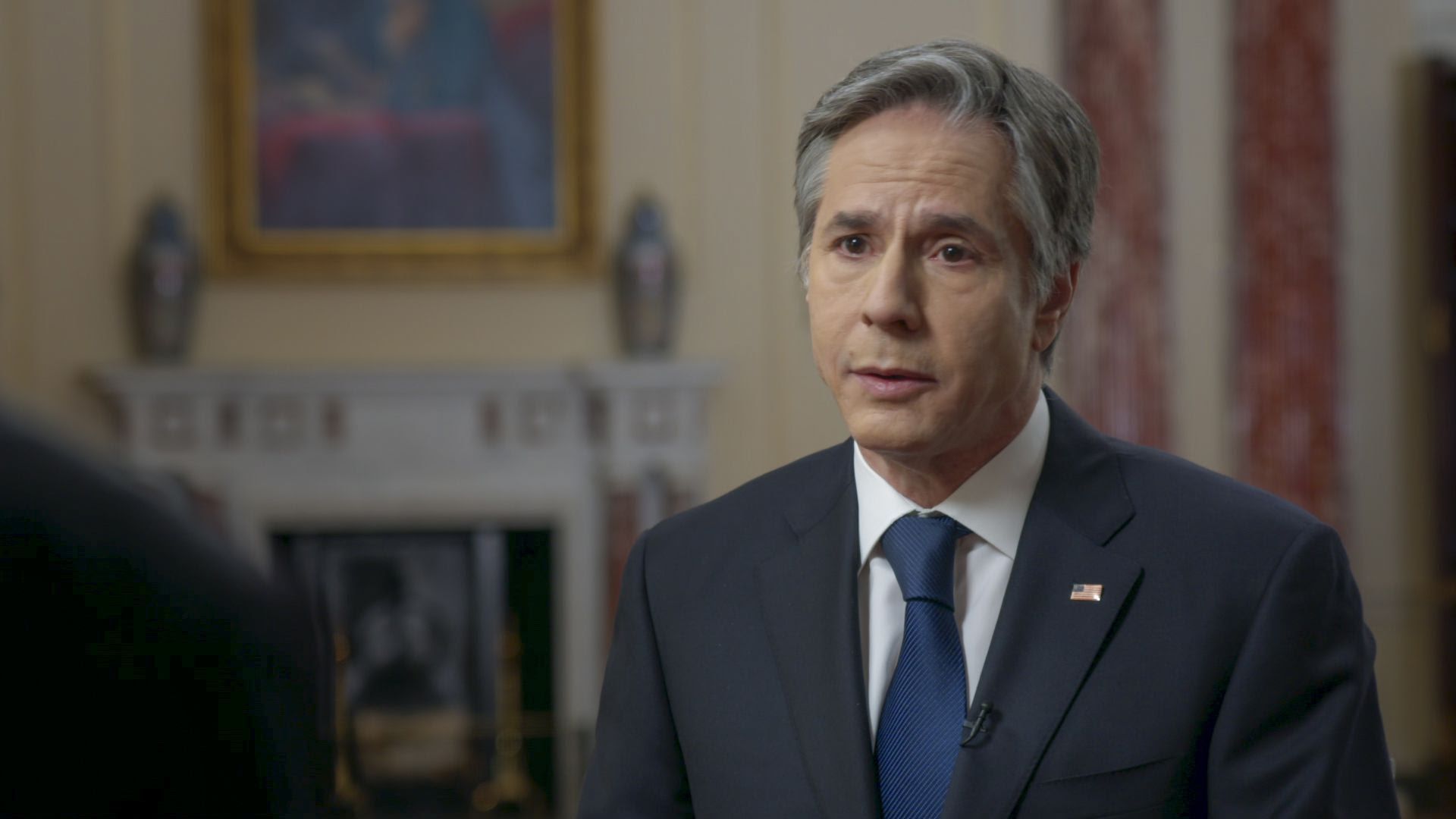| | | | | | | Presented By Malwarebytes Small Business Solutions | | | | Axios World | | By Dave Lawler ·Jun 07, 2021 | | Welcome back to Axios World. - We're taking off tonight (1,786 words, 6½ minutes) from Nigeria before stopping in Ukraine, Peru, Panama and more.
- My colleagues and I did a special report on Biden's foreign policy ahead of his first foreign trip this week. Check it out.
- Heads-up: I'll be moderating the first panel of the Center for a New American Security's annual national security conference tomorrow at 11am ET. Register here if you're interested.
New arrival? Subscribe. | | | | | | 1 big thing: Nigeria bans Twitter |  | | | Buhari. Photo: Audu Marte/AFP via Getty Images | | | | Nigeria's government is doubling down on its decision to ban Twitter indefinitely, with regulators today ordering broadcasters to stop using Twitter even to gather news, and the foreign minister summoning Western ambassadors whose countries criticized the ban. Why it matters: Twitter has been a powerful tool for younger Nigerians to mobilize, including during the massive #EndSARS protests last year against police brutality. The ban could have economic repercussions for Africa's most populous country, which has a burgeoning tech sector, and it sends an ominous signal about the country's democracy. How it happened: The ban was announced a day after Twitter deleted a tweet in which President Muhammadu Buhari threatened a secessionist movement in southeastern Nigeria and seemed to allude to the civil war (1967–1970) in which Buhari served as a military commander. - In announcing the ban, the government called Twitter a source of misinformation and a threat to Nigeria's stability, while noting that rebel leaders had been allowed to tweet incendiary things without facing such censorship.
- Misinformation and incitement to violence on social media are genuine problems in Nigeria, says Zainab Usman, director of the Carnegie Endowment's Africa program, but the government's rationale was highly "cynical."
- "This ban reinforces perceptions that the government is not very tolerant of criticism and that it is more preoccupied with its own survival than handling the serious issues of violent crime and insecurity across many parts of Nigeria," Usman says.
The backstory: Buhari is a former military ruler who returned as a democrat and is now halfway through his second and final term. - "He's never been able to shake a general's intolerance for dissent," says Judd Devermont, director of the Africa program at the Center for Strategic and International Studies, and he currently leads "a country under siege."
- "In every one of its six geographic zones, there is conflict and criminality or secessionist movements," says Devermont.
- Under intense pressure for its handling of the security situation, Buhari's government has been cracking down on journalists and civil society activists, Devermont says.
- "I'm deeply worried about Nigeria's democracy," he continues. One key test will be whether the National Assembly applies any pressure on Buhari over the ban this week.
Between the lines: The ban also exposes a vast gulf between Nigeria's young and increasingly tech-savvy population and its aging political elites. - Tweeting is now a crime, and the attorney general is calling for prosecutions. But Nigerians are flocking to virtual private networks, and many are continuing to tweet.
- There could be further restrictions coming. The government said on Friday that other social media platforms like Facebook would have to go through a licensing process.
The big picture: Nigeria isn't alone. Police in New Delhi visited Twitter's offices there two weeks ago after Twitter labeled a tweet by Prime Minister Narendra Modi as "manipulated media." - Modi's government gave Twitter a final warning to comply with new social media regulations or face "unintended consequences," Reuters reported on Saturday.
|     | | | | | | 2. Interview: Zelensky "surprised" and "disappointed" by Biden pipeline move |  | | | Volodymyr Zelensky. Photo: Sergei Supinsk/AFP via Getty Images | | | | President Biden called Ukrainian President Volodymyr Zelensky today and invited him to the White House next month. Between the lines: Based on a conversation Axios' Jonathan Swan and I had with Zelensky on Friday — and in light of the article we published on Sunday — it may have been a contentious call. - In the interview, Zelensky said he'd found out through the press that Biden had decided to stop trying to block the Nord Stream 2 Russia-to-Germany gas pipeline, which Zelensky sees as a dire national security threat because it bypasses Ukraine.
- Zelensky also implored Biden to meet him in person before he sees Vladimir Putin on June 16.
Behind the scenes: Zelensky clearly had a point to make. In response to Jonathan's very first question, about Nord Stream 2, Zelensky called the pipeline a "weapon" and accused Biden of giving Russia the bullets. Flashback: Zelensky said Biden had offered him "direct signals" that the U.S. was prepared to block the pipeline. Then came the news that Biden would be waiving the sanctions. - He said he had to listen to a White House press briefing to obtain an explanation: The administration said the pipeline was already nearly complete and cited the importance of good relations with Germany.
- Zelensky said he understands the importance of that relationship, but he asked: "How many Ukrainian lives does the relationship between the United States and Germany cost?"
Read the article + transcript. |     | | | | | | 3. Global elections roundup |  | | | Supporters of Castillo rally a day after the voting. Photo: Ernesto Benavides/AFP via Getty | | | | 1. Leftist Pedro Castillo has pulled ahead of right-wing candidate Keiko Fujimori with more than 95% of the vote counted in Peru's presidential runoff. At the time of writing, the margin was just 0.5%. - The big picture: There was no middle ground in this race. Castillo, who has promised to rewrite the constitution to allow for greater state control in the economy, fared well in poorer, rural regions. Fujimori, the daughter of a jailed autocrat, has taken most of the vote in the capital, Lima.
- What to watch: Experts have predicted potential challenges to the results, or even violence. Either candidate will struggle to govern a deeply polarized country that has had five presidents since 2016.
2. Germany's center-right Christian Democratic Union (CDU) won a regional election on Sunday in eastern Germany, bolstering the party's embattled leader, Armin Laschet, who will replace Chancellor Angela Merkel on the ballot in September's general election. - Why it matters: The election was seen as a major test for the far-right Alternative for Germany (AfD) in a favorable region for the party, which has lost momentum during the pandemic.
- "The AfD will continue to be a thorn in the side for the CDU, but is seemingly without a storyline going into the federal election," emails Sudha David-Wilp of the German Marshall Fund.
- The party's messaging has been heavily reliant on vaccine conspiracy theories and other misinformation, David-Wilp notes.
3. Mexican President Andrés Manuel López Obrador's Morena party kept its majority in Congress but failed to win the supermajority needed to change Mexico's constitution. |     | | | | | | A message from Malwarebytes Small Business Solutions | | Malwarebytes secures small businesses from hackers | | |  | | | | Malwarebytes offers cybersecurity options for businesses of all sizes. What this means: Choose from top-rated easy-to-use Next Gen AV for teams or centrally managed cloud-based Endpoint Protection & Endpoint Detection and Response, all including phone support. Check it out. | | | | | | 4. Migrants bound for U.S. take dangerous jungle path to Panama |  | | | A migrant carrying a baby crosses the Chucunaque River after walking for five days in the Darién Gap on the border of Panama and Colombia. Photo: Luis Acosta/AFP via Getty Images | | | | Panama is struggling to handle a surge of migrants crossing the deadly jungles of the Darién Gap separating the country from Colombia — many bound for the U.S., Axios' Stef Kight reports. Why it matters: Most migrants reaching the U.S. border still hail from Mexico, Guatemala, Honduras or El Salvador. But more people than before from farther-flung points are fleeing their homes and trying to enter the U.S. - Lax visa requirements in places like Brazil and Mexico, political and economic turmoil in South America, a still out-of-hand pandemic, and hopes of eased enforcement are driving the growing push north.
- "The trip through the Darién Gap presents migrants with really unimaginable hardships — thirst and hunger and crocodiles and snakes and armed cocaine traffickers and common thieves," Benjamin Gedan of the Wilson Center, a global policy forum, told Axios.
What they're saying: Reps. Tom Tiffany (R-Wis.) and Burgess Owens (R-Utah) visited the border village of Bajo Chiquito in Panama at the end of May. - "What we saw was people just rolling in, one after another," Tiffany said. "We saw people from Haiti, one person identified himself from Senegal. There was a person from Egypt. People talked about seeing Pakistanis come through."
Panamanian Foreign Minister Erika Mouynes told Axios 1,000 migrants had crossed into Panama in a single day, and she said the large and sporadic numbers can overwhelm towns in which the populations are smaller than the caravans. - Most migrants come from Haiti and Cuba, although hundreds who crossed from Colombia into Panama this year were originally from Bangladesh, Senegal or Nepal.
Go deeper: |     | | | | | | Bonus: Where in the World? |  | | | Screengrab via Apple Maps | | | | We're going a bit closer to Earth today and trying to identify some landmarks, in addition to the city. - The purple pin marks a church, opened in 1561.
- The red pin marks a small structure, built in 1930.
- In the bottom left you'll see a palace, built in the 1840s, though you won't find any royals there today.
Can you name them all? Scroll to the bottom for answers. |     | | | | | | 5. The view from Montevideo: Anxiously waiting for the vaccine effect |  | | | A testing center in Montevideo. Photo: Eitan Abramovich/AFP via Getty | | | | For almost a year, Uruguay was an island in the worst-hit region on the planet, Martin Aguirre, editor-in-chief of Uruguay's El País newspaper, writes from Montevideo. - Not only did the South American country manage to keep cases low after shutting itself off from the world last March, but it also managed to avoid most of the vitriolic political confrontation other countries in the region experienced during the pandemic.
- Uruguay never even imposed a lockdown, relying instead on voluntary decisions by the public. There were few better places to be as the pandemic swept the region.
- But everything started to change last December with a new variant arriving from neighboring Brazil.
Driving the news: Uruguay now has the fourth-highest per capita rate of new cases anywhere in the world, trailing only small island countries. Yes, but: Uruguay also has one of the world's fastest vaccination rates, vaccinating more than 1% of the population each day. - Currently, 30% are fully vaccinated and 55% have had at least one dose.
State of play: The government has declined to lock the country down, gambling that the vaccination program will drive the numbers down and that investments made in intensive care capacity will keep the hospital system afloat. - The weird thing, especially for someone who spends days in a newsroom under the pressure of this terrible news, is that the general public seems OK with the present situation.
- President Luis Lacalle Pou has a 55% approval rating, and the public health secretary's is over 65%. Even many opposition voters favor Lacalle Pou's "responsible freedom" strategy.
What to watch: It's now a race between the virus and the vaccines. Who will win, and at what cost? |     | | | | | | 6. What I'm watching: "Axios on HBO" |  | | | Photo: "Axios on HBO" | | | | Last night's edition of "Axios on HBO" was heavy on global affairs. Jonathan Swan had a double-header in Geneva with World Trade Organization chief Ngozi Okonjo-Iweala and Seth Berkley, leader of the GAVI vaccine alliance, while Mike Allen interviewed Secretary of State Tony Blinken - Okonjo-Iweala conceded that she had an "impossible job" — to get all of the world's countries, including the U.S. and China, to agree unanimously on trade policies.
- She also said the WTO had "serious design faults," including allowing countries like China to self-identify as "developing countries."
The most stirring part of the interview was when she recalled the time her mother was kidnapped as a result of her efforts to reform the oil industry as Nigeria's finance minister. - "If you've been through all of that, plus seven years as finance minister — longest-serving, first woman — I think it takes a lot of toughness," she said.
Berkley made the case that rich countries like the U.S. should consider postponing the vaccination of children to free up doses for high-risk people in poor countries. Blinken said China needed to be transparent about the origins of the pandemic, including the possibility it began with a "lab leak" in Wuhan, to be seen as a "responsible international actor." But he declined to say what the U.S. might do to pressure China to open the lab to inspectors. - Blinken also said the upcoming Biden-Putin summit would be a "test of the proposition" that the U.S. and Russia could shift toward a more stable relationship.
- Watch.
|     | | | | | | 7. Stories we're watching |  | | | Cooling off, in Bishkek, Kyrgyzstan, Photo; Vyachelslav Oseledko/AFP via Getty | | | - G7 reaches "historic agreement" on global tax reform
- El Salvador to make bitcoin legal tender
- Risk of Jan. 6-style violence in Israel
- COVID latest: India changes vax approach, U.S. donates to Taiwan
- Colombia to "modernize" police after brutality claims
- Bush family nonprofit's $5 million deal with China influence group
- Tiananmen Square anniversary: Police ban vigil; The world remembers
Quoted: "This is due to an accidental human error and we are actively working to resolve this." — Microsoft on why its Bing search engine showed no image results for "Tank Man" on the anniversary of the Tiananmen Square crackdown . |     | | | | | | A message from Malwarebytes Small Business Solutions | | Malwarebytes secures small businesses from hackers | | |  | | | | Malwarebytes offers cybersecurity options for businesses of all sizes. What this means: Choose from top-rated easy-to-use Next Gen AV for teams or centrally managed cloud-based Endpoint Protection & Endpoint Detection and Response, all including phone support. Check it out. | | | | Answers: We're in Moscow, visiting St. Basil's Cathedral (purple pin), Lenin's Tomb (red pin, in Red Square) and the Kremlin. |  | | The tool and templates you need for more engaging team updates. | | | | | | Axios thanks our partners for supporting our newsletters. If you're interested in advertising, learn more here.
Sponsorship has no influence on editorial content. Axios, 3100 Clarendon Blvd, Suite 1300, Arlington VA 22201 | | | You received this email because you signed up for newsletters from Axios.
Change your preferences or unsubscribe here. | | | Was this email forwarded to you?
Sign up now to get Axios in your inbox. | | | | Follow Axios on social media:    | | | | | |












No comments:
Post a Comment